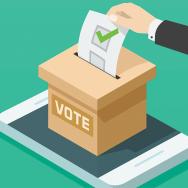When the death of George Floyd refocused public attention in the United States onto issues of police conduct and systemic racism, many companies felt compelled to make public statements of solidarity with those advocating for change.
Far fewer companies, however, found a way to complement those sentiments with any specific action supporting the goal of racial equality.
Prof. Sendhil Mullainathan argues there is a simple way for companies to back up those statements: Give all their employees paid time off to vote.
In a New York Times op-ed, Mullainathan—the Roman Family University Professor of Computation and Behavioral Science at Chicago Booth—pointed out that socioeconomic factors may make it more difficult for people of color to participate in the democratic process. Black and Latinx Americans are more likely to be low-wage workers, which means they are less able to afford to forgo lost wages in order to vote. “As economists would point out,” Mullainathan wrote in June, “paid time off for voting would increase overall efficiency as well as equity.”
He cited research by Chicago Booth colleague Devin G. Pope, who finds that voters in majority Black neighborhoods wait 29% longer at polling places compared to all voters on average—and are 74% more likely to spend more than half an hour at their polling place. Paid time off for voting, therefore, would not only foster democratically driven change, but help keep people of color from being shut out of the process.
An expert on machine learning and social policy, Mullainathan also drafted a tweet for employers to announce such a policy, ending with the hashtag #time4voting. He was unsure how impactful the op-ed would be—but effecting a change at even one company, he felt, would be worthwhile.
The idea turned out to have far more reach. Within two weeks, the article had been shared thousands of times over social media, including by former Obama administration official Valerie Jarrett, comedian Sarah Cooper and director Judd Apatow. More privately, Mullainathan heard from various corporate directors, who shared it among their fellow board members.
Some employers quickly and publicly embraced the idea: Educational assessment company New Meridian Corporation and healthtech company Thorne both featured Mullainathan’s hashtag in their announcements.
Mullainathan also circulated the op-ed among employers, and “a bunch of Booth alumni helped out in getting the word out (to employers) as well,” he said. As a result, he reported that several large employers have also pledged to give their workers paid time off to vote.
How many companies will ultimately join the #time4voting campaign remains to be seen—and how that may translate into increased voter participation will be impossible to gauge precisely. But “the idea is now more in the air than it was before, and people are picking it up and doing things,” Mullainathan said, “which is more than I could have hoped for.”
—A version of this story was first published by the Booth School of Business.

